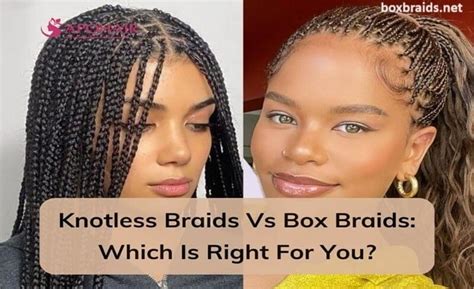When considering protective hairstyles, two iconic options emerge: knotless braids and box braids. Both techniques offer distinct advantages and cater to various hair textures and preferences. To help you make an informed decision, we present a comprehensive comparison between these two braiding methods.

Knotless vs. Box Braids: A Tale of Two Techniques
Knotless Braids
- Definition: Knotless braids, also known as invisible braids, are a modern braiding technique that eliminates the need for knots at the root. The hair is fed directly into the braid, creating a seamless, less bulky look.
Box Braids
- Definition: Box braids are a classic braiding technique that involves dividing hair into square or rectangular sections and braiding them from the root to the end using an underhand motion.
Advantages of Knotless Braids
- Reduced Tension: The absence of knots minimizes tension on the scalp, reducing the risk of breakage and hair loss.
- Lightweight: Knotless braids are lighter than box braids due to the lack of knots, making them more comfortable to wear.
- Seamless Appearance: The elimination of knots creates a natural, “invisible” look, blending seamlessly with your own hair.
- Versatile Styling Options: Knotless braids can be styled in various ways, from buns and ponytails to intricate updos.
Advantages of Box Braids
- Durability: Box braids are known for their extreme longevity, lasting anywhere from 4 to 8 weeks with proper care.
- Versatility: Box braids offer countless styling possibilities, from simple braids to complex designs and extensions.
- Protective: Box braids provide excellent protection for natural hair from environmental stressors and mechanical damage.
- Cultural Significance: Box braids have a rich cultural history and are deeply rooted in African and African-American traditions.
Pain Points and Motivations
Knotless Braids:
- Pain Point: Can be more time-consuming to braid than box braids due to the more intricate technique.
- Motivation: Desire for a less bulky, more natural-looking appearance.
Box Braids:
- Pain Point: May cause tension on the scalp, especially in individuals with sensitive hair.
- Motivation: Need for a durable and versatile protective style.
Strategies for Seamless Braiding
Knotless Braids:
- Use high-quality hair extensions that match your natural hair texture.
- Prepare hair by washing and conditioning it thoroughly.
- Divide hair into small, equal sections to ensure even distribution of weight.
- Feed hair directly into the braid, avoiding the creation of knots.
Box Braids:
- Choose a braiding pattern that complements your facial features and hair type.
- Use a rattail comb to create clean, precise parts.
- Hold the hair taut while braiding to prevent slippage.
- Moisturize the braids regularly to prevent dryness and breakage.
Why Box Braids Matter: A Cultural Perspective
Beyond their aesthetic appeal, box braids hold cultural and historical significance. For centuries, they have been worn by African and African-American women as a symbol of identity, tradition, and empowerment. Box braids have also played a vital role in shaping popular culture and fashion.
Benefits of Braiding Methods
Knotless Braids:
- Promotes hair growth by reducing tension and breakage.
- Enhances versatility by allowing for numerous styling options.
- Offers a more natural-looking appearance, blending seamlessly with your own hair.
Box Braids:
- Protects natural hair from environmental stressors and mechanical damage.
- Encourages hair growth by creating an environment conducive to moisture retention.
- Offers extreme durability, lasting for several weeks with proper care.
Table 1: Comparison of Braiding Techniques
| Feature | Knotless Braids | Box Braids |
|---|---|---|
| Tension on Scalp | Low | Moderate |
| Weight | Lightweight | Heavier |
| Appearance | Seamless, natural-looking | Defined, chunky |
| Styling Versatility | High | Very high |
| Time Required for Braiding | More time-consuming | Less time-consuming |
Table 2: Pain Points and Motivations
| Pain Point | Motivation |
|---|---|
| Tension on Scalp (Knotless) | Desire for a less bulky, more natural-looking appearance |
| Time Consuming (Knotless) | Need for a durable and versatile protective style |
| Tension on Scalp (Box) | Desire for a less bulky, more natural-looking appearance |
| Cultural Significance (Box) | We need for a durable and versatile protective style |
Table 3: Effective Strategies for Seamless Braiding
| Knotless Braids | Box Braids |
|---|---|
| Use high-quality hair extensions | Choose a braiding pattern |
| Prepare hair by washing and conditioning | Use a rattail comb |
| Divide hair into small, equal sections | Hold hair taut |
| Feed hair directly into the braid | Moisturize braids regularly |
Table 4: Benefits of Braiding Methods
| Knotless Braids | Box Braids |
|---|---|
| Promotes hair growth | Protects natural hair |
| Enhances versatility | Encourages hair growth |
| Offers a more natural-looking appearance | Offers extreme durability |
